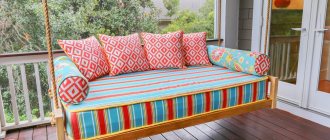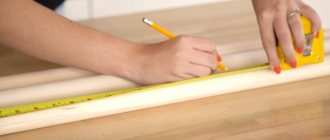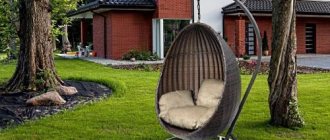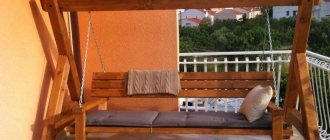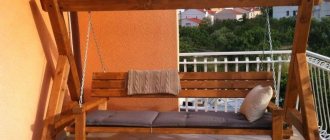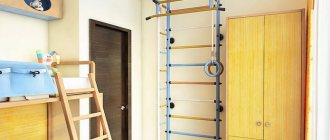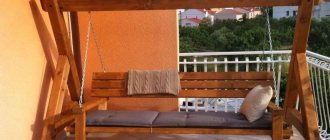Swings are not just for fun. For adults, they calm nerves, improve mood and put thoughts in order; especially if you sway and contemplate the clouds in the sky. Children and teenagers on swings train their vestibular apparatus, develop coordination of movements, and, as they say, feel physics with their whole body. Schoolchildren who know how to swing well on swings, as a rule, do better academically and immediately grasp such difficult concepts as, for example, the moment of inertia of a body.
Making a garden swing with your own hands is not a difficult task. Who in childhood did not swing on a plank suspended from a tree branch on ropes? Or didn’t he flop into a river or pond while swinging on a bungee? And having at your disposal a certain amount of material, a simple tool and not entirely crooked hands, you can build a relaxation corner in any situation, which in its effect is not inferior to a rock garden arranged according to all the rules, see fig.
Homemade swing
Dacha grace
Outdoor and yard swings are placed wherever there is space. At the dacha, too, in general, there is not an abundance of it, but for yourself it’s worth figuring out how to collect dacha pleasures into one eden: you save space, and, if you really want to relax, then there are beds that make your hands callused, your eyes didn't cause calluses. Here, as usual, everyone is their own boss. However, there is a very good universal option: hang a garden swing in a pergola, see fig. If it is, of course, strong enough for this. Dig up and arrange a decorative pond nearby - and you’re ready to create a piece of paradise with your own hands on less than 1 acre.
Country swings in pergolas
Options for children's toys
It is almost impossible to list the types of swings. They are made from any materials that can be found around the house. Conventionally, three options can be distinguished:
- portable;
- domestic;
- for the street.
Each of the above types has its own design features.
About metal swings
They most often make their own swings from wood: it is more familiar, more comfortable and easier to work with. But if, say, the whole world were to equip a children's playground, then a stronger and fireproof structure would be needed, so that the urchins would not have to be pulled back every now and then, and it would be difficult to damage the swing by hooliganism, which, alas, will not be tolerated. In such a case - in Fig. Below is a drawing of a classic, so to speak, yard swing made of metal: pipes, corners, strips, rolled wire, with a canopy. In the future, we will pay more attention to wooden swings, except for those cases when metal is needed for strength: for a sports corner for a teenager, etc.
Drawings of a metal swing
Note: there are also cases when metal as a structural material for a swing is chosen according to other criteria. For example, at pos. 1 pic. on the right is a forged swing. Their production requires high skill, and to order it is very expensive, but the prestige is obvious. But at pos. 2 in the same place - a metal swing made from channel scraps. For those who know how to handle a welding machine and an angle grinder, their construction is a half-day job, and the bright coloring masks the utilitarian nature of the material.
DIY wooden swing for children
Since it is not always possible to find a durable tree on your own site, and it is a shame to spoil it, it is better to immediately take care of a durable structure for placing the swing. If you do not have the skills to work with metal, the best option would be to build from wood. In this case, you can use both prepared lumber (timber, round logs, boards) and improvised material - trunks and branches of cut trees cleared of bark (or even not debarked). In the second case, you should definitely check the prepared parts for rot, mold, cracks and other defects.
Depending on the chosen design (A-shaped or U-shaped), the base of the structure is prepared:
- racks - one (for U-shaped) or two (for A-shaped) parts;
- a crossbar that will serve as a place for hanging the swing;
- additional tie bars (optional);
- the swing itself with hanging elements (rope or chains).
One of the simplest and most stable do-it-yourself wooden swings for children is shown in the diagram below.
Here, the A-shaped side elements have two additional connections - at the very top (a gusset made of metal or wood, secured to the wood with self-tapping screws) and a bar approximately in the middle of the height. To strengthen the structure, braces are also used to connect the gusset and cross member. The legs of the supports are buried in the ground to a depth of 30...50 cm, and it is advisable to concrete them. Thus, to the height of the swing indicated in the sketch, it is worth adding 30...50 cm for depth.
If there are two or more children in the family, you can choose the option of a children's swing with your own hands for two places.
In this diagram, the height is also shown without taking into account the penetration of the supports into the ground.
The seat is suspended using ropes on protective loops or chains. For fastening to the crossbar, hooks are screwed in from below or through holes are drilled for threading the rope.
Another option for mounting the seat on the crossbar.
If you want to make not just a do-it-yourself wooden swing for children, but a full-fledged place for relaxation, you should work a little and build a structure under a canopy with a neat sofa instead of a simple board.
The best for children
People don’t start swinging on the hanging swing right away. For kids who have just learned how to properly rearrange their bottom two, it’s just right to ride on a pendulum swing. Which, by the way, also develops motor skills and strengthens the musculoskeletal system. Parents who have built a children's pendulum swing for their offspring are soon convinced: abrasions on the knees and elbows, broken noses, roaring and resentment from both have noticeably decreased. Although, of course, it’s still not without it. But the swing will help children develop reasonable caution and common sense, avoiding serious injury.
It is known how a pendulum swing works. Shown in Fig. This option is interesting because it requires as many as 11 nails for metal fasteners:
Children's swing-pendulum
Parts marked (!) are made of hard, fine-grained deciduous wood - oak, beech, hornbeam, walnut. The ends of the pendulum axis do not need to be ground to a perfectly round shape: it is enough to plan them more or less evenly so that they fit into the sockets with a slight interference, and shake the board several times to get it to work in. If the fibers in the axle and support posts are oriented mutually perpendicular (which can be easily observed by cutting them from one board), then the swing will last for many years, and the rubbing surfaces will soon become mirror-smooth and durable, as if they were turned from steel on a machine.
The pendulum swing can be made portable so that, say, you can take it to the veranda for the winter. 2 ways to do this are shown there, pos. a and b. According to method a, the ends of the racks are concreted in an unusable tire; Method b is obvious and simpler, but both riders may fall to the side along with the swing. By the way, you can get a lot of other benefits from old swing tires; We will return to them later.
Swings for older children are made hanging, like for adults (see below), with some features:
Children's swings for schoolchildren
- The supporting beam of the swing is made of timber with an extension to which a ladder leads, see fig. on right.
- It’s even better, if there’s enough space, to put an additional lower support on the side, so that in addition you get a horizontal bar, see fig. below. In this case, it is preferable to make the entire sports corner, except for the horizontal bar crossbar, from a profile pipe, then the entire structure will be stronger, cheaper and technologically simpler.
- Suspension of a rocking chair for children who already know how to swing is best suited to the rope scheme 2-2 (see below). Then you can, without risking pinching or even breaking your finger with the chain, swing, it will take your breath away. And the right materials and design of the suspension will not allow you to “spin the sun” and dive down from its highest point, or turn into a projectile fired from a sling, unable to group for landing, like acrobats.
Children's sports corner made of profile pipe with swings
Note: when choosing or designing a swing, do not neglect safety precautions! When swinging at full swing, the speed of the rocker at critical points of the trajectory exceeds 50 km/h! Accordingly, the result of falling or falling from a swing will be equivalent to an accident at the same speed.
Swings for small children
There are also swings for newborns and infants. There are many benefits from them, but they are medical equipment. It is strongly not recommended to make such a swing yourself, but choose store-bought ones and use them only as prescribed by your pediatrician.
For babies from about six months old, whose eyes are already looking meaningfully (this means that their vision has developed and they see clearly), a children's swing for little ones will be useful, see fig. on right. They cost a lot, but making similar ones yourself is very easy from pipes, PVC or propylene, and cutting plywood, see video:
Video: baby swings for babies
Just don’t forget to cover the ends of the pipes with polystyrene foam: at that age, a finger can fit into a small hole, and you want to stick it there. They swing a child in such a swing, holding the suspension with their hands; In an apartment, the same plastic pipe will serve as a cross member; the weight is light.
Note: the swing is most often the basis of a children's corner. What else is needed for it, and how to put it all together, requires a separate description in parts. For example, you can watch the following video:
Video: children's playground with swings in the “Hacienda” program
Types of homemade children's swings
It is impossible to list all the existing types of rides. Parents invent swings for their children from things lying around the house. However, all of them can be conditionally divided into three groups: for home, outdoor and portable models.
Children's swings for home
There is no swing just for indoor use, since if desired, it can always be taken outside. However, such attractions for children have their own characteristics. The first of these is compactness. Most often they do not have a supporting frame.
They make a children's swing for an apartment with their own hands, hanging on ropes. The seat is a piece of board, plastic window sill or a chair with armrests and a front crossbar. The second feature is that more often parents try to make soft seats for their children. Cocoons, simple strips of tarpaulin, and rings with mesh are popular. Children love to swing a lot. A soft seat will cause less damage to furniture or wall decoration upon impact.
Indoor models are often suspended from the ceiling if it is made of concrete floor slabs. The brackets can support the light weight of children.
Portable models can similarly be classified as outdoor and indoor attractions. Such designs are usually designed for small children. Factory-made and hand-made products are often made from a thin-walled metal tube. The frame is folding or collapsible. The seat is a child-friendly chair with armrests. For the youngest children there is a front bridge. The limiter prevents the baby from falling out of the chair while rocking.
Children's swing for outdoors
Attractions intended only for outdoor use cannot be brought indoors, even if children wish to do so. The swings are large in size. First of all, this concerns the frame. It is welded with your own hands from a pipe or using lumber. It doesn’t matter how many children the structure is designed for. According to the rules, the frame of a children's outdoor swing is made with your own hands and is 2-2.5 m high. The seat has a large swing angle. Such a children's attraction is inappropriate inside an apartment.
Important! Outdoor swings are not always made in the form of seats suspended on a frame. Children create their own balance beams, rides on springs and even small carousels.
To adults and everyone, everyone, everyone
Now it’s appropriate to ask: how is a swing designed for the whole family?
So that both adults feel comfortable swinging, and children also enjoy it? It is quite possible to find a compromise: the seat should have a double backrest, but not be very massive. The seat is strong enough so that a large child can stand on it. We use a chain suspension, because the rope will stretch under such a load. Its design should ensure fairly easy swinging without outside help, limiting the angle and speed of swinging, and long swinging after it. It is advisable to make a family swing from wood for the reasons stated above: they are more comfortable, and production does not require complex tools or special equipment. It is also highly advisable to make do with 1-2 standard sizes of lumber, and what is cheaper - a regular edged board. For durability, the workpieces are impregnated with biocides (antiseptics) and water repellents (water repellents).
Since the swing is not a residential building and will dry out very quickly in the air, there is no point in spending money on expensive branded products. Used motor oil (waste oil) is suitable as a biocide, and a water-polymer emulsion or, instead, PVA or water-based tile glue, diluted 3-5 times, is suitable as a water repellent. The pieces cut to size are first impregnated with processing, and after 3-7 days with emulsion.
Drawings of a family swing of this “classic” type are shown in Fig; The length of the legs is given based on their penetration into the ground by 0.5 m:
Drawings of a family swing made from boards
Their peculiarity is that they are built entirely from boards, without the use of more expensive scaffolding, as can be seen from the material sheet, pos. 2. At pos. Figure 3 shows the method of adjusting the supports before assembly: a crossbar board is used as a slipway. The legs, cut to size and at an angle (see below), are applied to the slipway and spread to the required width (at the same time, the accuracy of the cutting is checked). Then the blank of the lower strut is applied, set parallel to the building stock according to the distance of its ends from it, and marked for cutting in place. The upper ones are made from scraps of the lower spacers.
Note: in fig. on the right is a method of marking leg blanks based on an angle between them of 30 degrees. Markers on a steel bench square are made from several turns of soft wire with bent ends.
Seat place
To decorate a bench or sofa, you can be guided by a photo of a swing made by yourself; all kinds of images show excellent options for finished products that are easy to repeat with your own hands. The frame is usually assembled from bars; it is worth paying attention that the backrest should not be lower than 600 mm, otherwise it will not be very comfortable to sit on such a bench.
The recommended depth starts from 480 mm, but it can be edited according to the wishes and preferences of the owner. Most often they experiment with backrest tilt; by choosing the ideal position, you can achieve the most comfortable resting position.
Swings of our own design
You may have a question: how to make a swing completely yourself? Schemes and drawings are good, but if there is already material (let’s say, left over from construction) that is clearly enough for a swing, but does not fit into this design? And I don’t want a standard product, I want something of my own. Finally, in Fig. at the beginning it is clear that the most luxurious original swings are obtained from dead wood and waste from garden pruning. How to make a beautiful, comfortable, durable and safe swing from all this? Well, let's get started. Order:
- Dimensions;
- Foundation and method of attachment to the ground;
- Support frame;
- Suspension methods and designs;
- Suspension units;
- Rocking chair, also known as a seat;
- Methods for hanging a rocking chair.
Finally, let’s look at a few more non-trivial designs and special, but built on the basis of ordinary, special-purpose swings.
Dimensions and proportions
The dimensions of the swing are calculated, firstly, based on the width of the park bench seat for 1 person - 60 cm; the minimum value is 40 cm. The height of the seat above the ground is taken a little more than the standard chair height of 40 cm, so that, on the one hand, you can swing without touching the ground with your feet and at the same time, stretching your legs, you can slow down; on the other hand, to make it more comfortable to sit down/stand up. Usually they take 50-55 cm, but in general they adjust it to suit themselves by adjusting the height of the suspension, see below.
Note: for paired swings with longitudinal swing, the height of the suspension of the board (boat) is taken to be 0.7 of its length. For boarding and disembarking, a platform is then needed, and for the rocking chair, a smoothly acting brake (in case someone gets sick on it, or he/she gets scared and panics), activated by the operator from the ground. Therefore, paired swings with longitudinal swing are almost never used in everyday life.
A suspended swing consists of a supporting frame (2 support posts + crossbar), a suspension system and a rocking chair, also known as a seat. The distance from the edges of the seat to the side supports is taken at least 150 mm for a chain suspension of type 2sh-4 or 4-4 (see below), for any other chain suspension from 250 mm, for ordinary rope suspensions from 350 mm, and for any suspension with 1 attachment point at the top - at least 0.7 of the total height of the suspension system. These requirements are based on the fact that with any swing, lateral rocking is inevitable, and the rocking chair touching the support is unpleasant and, if the rocking is strong, dangerous. That is, if, for example, we have a 40 cm seat suspended on ropes, then the width of the span between the supports should be at least 35+40+35=110 cm.
The distance from the seat to the crossbar should be no less than the height of the person on the swing, so that, firstly, you can swing while standing, and secondly, so that when you suddenly get up you don’t hit your head. It is taken within the range of 190-220 cm, depending on the available material.
The angle between the legs of the side supports is 30-40 degrees; most often - 30. Then, if you take workpieces half the standard length of 6 m, i.e. 3 m, then taking into account the depth of the legs and the thickness of the workpiece, it will be possible to stand up to your full height on the seat. In addition, the area occupied by the swing is reduced.
Note: the thickness of the material of the load-bearing parts is taken based on a 3-fold overload during swinging. For a high-quality wooden beam this will be from 150 mm in height, and for steel pipes - from 40 mm in diameter or square side.
Ground anchorage
The legs of a wooden swing are either dug into the ground 1 m or more, or concreted to a depth of 0.5 m. Then, taking into account a 10 cm gravel cushion, holes for the legs need to be dug with 2 shovels, i.e. 60 cm. In both cases, the ends of the legs, before installation in the pits with a margin of 15-20 cm in length, are either impregnated with bitumen mastic (40% bitumen and 60% white spirit or solvent), or poured with bitumen heated almost to a boil, and, barely cooled down, sprinkle with sand; This method better protects against rotting.
To pour bitumen, bricks are placed under the foot so that the end can also be poured. They pour it in a thin stream, for which it is convenient to heat the bitumen in an unusable tin with a pulled-out spout. Having poured one side, the leg is immediately turned over and the other side is poured, trying to get it onto the end as well. Sand is sprinkled in the same order.
Attaching metal swings to the ground
With a metal swing, the situation is more complicated: a thin pipe compared to a log or timber can, over time, either turn out of the ground or break on the concrete itself, because This is where the loads are concentrated during swinging. Therefore, metal outdoor swings for public use must be made with support frames in the form of a solid triangle and concreted into a trench, then the metal beam embedded in it will take on a significant part of the effort and relieve the load on the legs.
The legs of the swing without additional supporting elements, like those shown above from the channel, are concreted to a depth of at least 1.2 m, regardless of the freezing depth in the area, then the channel will be able to transfer part of the loads to the concrete. It is best to tie a regular metal swing at the bottom with an additional supporting frame and attach it to the ground with anchors at least 1 m long, see fig. This, by the way, will allow, if necessary, to return the land to economic use without any problems.
Frame
Country swings are most often made on a frame of 2 A-shaped supports connected by a transverse beam. Sometimes, if the swing is equipped with a rigid awning, the frame is made on 4 posts with a canopy, see below. In hot sunny places where an awning is needed all summer, this provides some material savings.
Recently, a frame on λ-shaped supports has become increasingly popular, on the left in the figure:
Bearing frames of the swing
During construction, it saves a whole beam of wood, which is significant given current prices for lumber. But this is a swing only for adults: when swinging at full swing, the supporting beams may not hold up - the wooden ones will break, the metal ones will bend. By the way, you can’t make a λ-frame from ordinary structural steel; it will bend right away. We need very expensive special steel.
Frames with a traverse (in the center in the figure) are known to everyone: a swing on a branch is what it is. Specially traverse frames are made for acrobatic swings with 1 point of suspension of the rocking chair; on them, having mastered the swinging technique properly, you can write intricate pirouettes. In this case, the wood on the frame is double thickness, and the concreted ends of the legs must have firmly attached crossbars.
A type of traverse frame is a metal mobile one. They are made of high-quality steel, loads, moments, center of gravity, etc. mechanical intricacies are accurately calculated. Popular (and very expensive) swing-chaise lounges are made in a similar way, on the right in Fig.
Wooden frames
Log
The most effective and, in many cases, inexpensive swings are made from logs. It is not necessary to take debarked and rounded ones: as already mentioned, pruning waste and dead wood will go. The frame from the latter, if the trunks are still strong and powerful, does not need additional reinforcement, pos. 1 in Fig. Swing frames are made of commercial logs, especially if they are mobile, i.e. not dug in or concreted, needs to be reinforced with struts, pos. 2 and 3. In the latter case, the same amount of material is needed, but the frame covers the sky less. The question arises, why aren’t the frames recessed? In order not to spoil the lawn or paved area, in Fig. it is seen.
Log swing
If the swing is dug in or concreted, then the most economical and durable frame is like that of a Chinese swing, pos. 4. Although such swings have long been known in Russia; They were often made in birch forests, tying together the tops of trees in pairs. The “Russian-Chinese” swing can also be made non-recessed by providing an additional frame at the bottom. A drawing of such a design is given below. rice: legs - logs or square beams, crossbar - timber 180x80, bottom frame - from boards 150x40.
Drawing of a wooden swing frame for adults
timber
An ordinary, non-profiled wooden beam gives the possibility of constructing a swing greater than a log. It is easier and cheaper to make a swing with a permanent canopy for hot countries, pos. 1 in Fig. A conventional frame on A-shaped supports made of timber (item 2) will also be simpler and stronger: under the weight of the rocker, the legs compress the crossbar (item 3) and the more the swing is loaded, the stronger the frame holds. In the frame of the “Russian-Chinese” swing made of timber, at the top you need, as for logs, only 1 fastening unit, pos. 4, and installing a canopy over a swing made of timber on A-shaped supports is also not difficult, pos. 5.
Timber swing
Moreover, a crossbar made of timber can be used in the same way as for the legs, i.e. reduced cross-section (100x100 mm), if you reinforce it at the ends with overlays from the board, and the hanging points of the rocking chair are placed close to them, pos. 6. Then the bending moments of the crossbar will, as it were, flow into the compressive legs, and the tree holds the compression load well.
To enhance this effect, the crossbar is sometimes placed below the tops of the supports, pos. 7, but the gain in strength turns out to be illusory, but the extra fasteners are noticeable and cost money. Using this principle, it is better to cut off the tops of the supports and additionally secure the crossbar on top with overlays, pos. 8. Then it will be possible, if the crossbar is 150x150, and the legs are 200x200, to make the crossbar extensions up to 1.5 m, and hang a children's swing on ropes to them, attach a ladder with a slide, etc. The result will be a family swing and sports corner with a material consumption of only slightly more than for one swing.
And another question: is it possible to replace the timber with a board, say, 150x40? It is possible, as shown in pos. 9, only it is no longer possible to make extensions and the height of the supports will have to be limited to approximately 1.8 m. The swing will be just as strong, but much cheaper than timber swings. Well, it will take more work - marking, cutting, stitching.
Note: the “classic family” swing described above is even more economical, but its legs must be concreted, otherwise the plank frame will be fragile. And those shown in pos. 5, 6 and 9 are mobile, they can simply be placed on the ground or floor.
How to install the frame?
The swing crossbar must be horizontal, otherwise the rocking chair will wobble unpleasantly on any suspension. Setting it up with a bubble level is difficult and troublesome, a hose level is not much easier, and a laser level that builds planes, of course, is not just kept on the farm.
You can set the crossbar of the swing using one of the oldest leveling devices - the Egyptian plumb line, see fig. It fell out of use in ancient times due to low accuracy, but it is enough for a swing. You can use a bucket of sand as the bottom load, and the top weight, in addition to the usual plumb line, can be any piece of iron - a bolt, a nut.
Hangers and Pendants
The suspension of the rocking chair determines the convenience, comfort and safety of the swing. This rather complex node should:
- Prevent swinging as little as possible within safe limits.
- Gently absorb the energy of the rocking chair if the swing speed/angle is outside the permissible limits.
- Ensure rocking without jerking and with as little sideways wobble as possible.
- An acrobatic suspension should provide the same in 2 planes.
Rocking chair suspension schemes are indicated by formulas of the form nmk, where n is the number of suspension points at the top, m is the number of intermediate suspension points, and k is the number of them on the rocking chair. Somewhat similar to the wheel formulas of steam locomotives, but this is pure coincidence: for a steam locomotive, m cannot be equal to 0, because denotes the number of moving axes, and for a swing - easily.
Some types of rocking chair suspensions are shown in Fig:
Swing hanging methods
Suspension type 1-2 with a soft flexible rocking chair (not shown in the figure) is called a flying trapezoid. Suspensions of types 1-mk are used in swings on traverses. Garden and country swings are most often hung using methods 2-4 (the simplest), 2-2-4 (prevents it from swinging excessively) and 2sh-4 (also you won’t swing too much and there’s no wobbling).
Of particular note is the 4-4 suspension. It’s actually not a swing: how do you swing on something like that? However, it is sometimes used for original garden benches (on the left in the figure):
Bench-swing and gazebo-swing
Some find a little erratic rocking to be soothing. But most often, the 4-4 method is used to hang swing gazebos, right there. A matter of taste, some people like it. The eastern rulers of the past, and even the present, they say, simply delight in such people in the company of their concubines.
Chain, rope or rods?
Cross lay cable
Hanging a swing on a rope is the easiest and, if you know how to tie some sea knots (see below), does not require expensive additional fasteners. But the rope, as you know, stretches, and the spiral weave does not limit the swinging in any way. Therefore, firstly, it is better to hang the simplest children's summer swing on ropes, pos. 1 in Fig. below. Secondly, take a cross lay rope, see fig. on right. It has a lot of internal friction, which is why riggers don’t like it (the efficiency of lifting mechanisms drops), but for a swing this is exactly what is needed so that a foolish child doesn’t do a somersault. The diameter of the nylon cross rope for swings is from 24 mm.
Swing hangers
Chain suspension, pos. 2, expensive, but in terms of its totality of characteristics it is optimal in all respects: the chain is strong, its wear is immediately visible, it almost does not slow down small swings, and it dampens excessive swings due to friction in the links. However, due to the latter circumstance, the smallest ones in swings on chains for adults can seriously pinch their fingers; For children's swings, small-gauge chains are used.
The rocking chair on rigid rods (positions 3 and 4) is usually suspended on bearings. It swings very smoothly, without the slightest wobble, and, as they say, even a mosquito will swing on it. But such swings without additional safety measures are dangerous: crashing your head into a stone fence or curb at a speed of 60 km/h is no longer an accident, it’s a tragedy. Therefore, on-site swings with rigid rods for children should, firstly, be equipped with a rocking chair with a fence, as in a swing for children, pos. 3. Secondly, it’s still impossible to let a child on them without adult supervision.
Swing with swing limiter
In a public yard swing on bearings there must be a swing limiter - you never know who can get in there and how can they swing? The rocking chair hits against a simple stopper made of a pipe (see figure), which is unpleasant. In good branded models of swings with rigid rods, the bearing suspensions are made with a built-in hydraulic brake, which operates on the principle of a viscous coupling in cars with AWD drive, but such suspension units are expensive.
Sometimes rocking is also limited by connecting the rigid rods of the rocking chair to the frame with lengths of chains, pos. 5. But, generally speaking, this is not the best solution: due to the different mechanical characteristics of the suspension links, even a small and completely safe swing on such a swing occurs with noticeable jerks.
Note: there is also a whole class of luxury swing suspensions based on systems of balanced levers, springs, and hydraulic shock absorbers. It’s clear that it’s expensive and you can’t do it yourself.
Suspension units
The critical points for hanging the swing are the attachment points. They bear very large alternating loads and are subject to abrasion. A small burr on the rubbing surface of the fastening will give very noticeable jerks when rocking. Therefore, the choice of design of fastening units must be approached with all responsibility.
The cheapest, but also the worst option is S-shaped hooks, pos. 1 in Fig. Huge loads are concentrated in their crossbars, the probability of sudden destruction is high, therefore such fastening is only permissible for swing benches suspended no higher than 0.5 m and the design of which allows them to sway barely.
Swing suspension units
The most reliable fastening is on clamps with carabiners, pos. 2. The main load falls on the top of the crossbar beam, which is absolutely safe. It is only necessary that the carabiners have safety teeth and an anti-friction insert: sliding of the suspension rod in the eye of the carabiner is already an emergency mode in case of excessive swinging.
Reliable clamps still spoil the appearance of the swing, so fastenings are most often made using eye bolts, pos. 3. Indispensable conditions for their maximum reliability - the bolt must pass through the crossbar, under the nut, regardless of the material of the crossbar, a steel washer of at least 60 mm in diameter and 4 mm in thickness must be placed, and the nut must be firmly locked. When swinging, spring washers of all types do not prevent the gradual spontaneous unscrewing of a single nut!
The reliability of the eye bolt is absolute - the neck of the eye (ring) is subject to great stress. The slightly more expensive U-hooks and shackles, pos. 4. A blind hole is drilled in the crossbar under the hook bar and it is inserted there tightly. Without being able to straighten out even a little, the hook will withstand an incredible load, because... The destruction of a metal begins with micro-disruptions of the bonds between its crystallites.
The eyebolt, U-hook and, to a slightly lesser extent, the rigging shackle significantly weaken the deadbolt, because the concentrated force applied from above tends to break it just where the beam is weakened by the hole, and the fastening pin, as it swings, “breaks” it. The washer weakens this effect, but does not eliminate it completely. As a result, where it would be possible to get by with a 100x100 mm solid beam, you have to install 150x50 mm, and in anticipation of swinging at full swing, even 200x200 mm.
Conspicuous, but ideal in all respects, are the through fastenings with an overlay and an upper suspension, pos. 5 and 6. The shear forces from them spread freely to the sides along the beam and tend not to tear, but, on the contrary, to compress the hole, as if it does not exist; the beam now becomes equivalent to a solid one. In addition, although such a suspension looks like a 4-4, it is kinematically equivalent to a chain 2-2-4, but it dampens excessive swing even better and more smoothly. If the suspension with overlays is rope, then between the carabiner and the fire (loop) of the cable you need to place a solid ring, pos. 6.
Also, rings connect the branches of the 2-2-4 chain suspension. The upper branch is welded to the ring or soldered with hard solder, and the lower ones slide along it freely, pos. 7. Only then will the 2-2-4 chain suspension acquire the required kinematics.
Rope hangers are good because they allow you to easily adjust the height of the rocking chair, but, made “chain-by-chain”, they require a fairly large number of expensive fastening, locking and adjusting parts and assemblies, positions. 6,8 and 9. However, all of them, with one exception that is easily accessible for self-production, can be replaced with marine units for the appropriate purpose. The reliability of maritime knots has been tested over thousands of years of maritime practice, and their complexity exists only in the popular imagination.
You don’t need to know 200-400 knots, like a boatswain of a sailing fleet, or at least 20-40, like a current yachtsman, to build a swing; 7-9 is enough for everything, see fig:
Sea knots for swings
A – anchor knot, or fishing bayonet, for attaching a cable to a carabiner with an anti-friction gasket or an intermediate ring. Up to 5 hoops (turns) can be inserted into the eye. A simple mark is applied to the running (free) end of the cable and it is used to connect the running end to the tensioned one, shown in the red frame. The fastening holds until the cable rots or the eye rusts. The anchor knot is non-tightening, it is not difficult to untie it: just remove or cut the mark that tightens the ends.
B – bed knot, also non-tightening. Suitable for the top suspension of temporary, say, for weekends, children's swings.
B – bayonet with rim, the same as B, but for adults.
G – locking knot, or figure eight. For lower mounting of children's swings through holes in the board.
D, F - sealing the end of the cable with a turnip and a simple disk button. The same as G, but for adults, and the cable tails do not dangle. Although, in general, it is better to fasten a rocking chair on ropes by the bottom without any knots at all, as described below.
Z – net knot, for tying 2 ropes crosswise anywhere without cutting.
And - this is how a loose loop is knitted on a solid rope. You can hang an umbrella, a siphon with soda, attach a shelf or something else.
Note: there are also simple knots for tying 2 ropes, identical or different, for example. weaving knot. However, it is strongly not recommended to assemble a swing rope suspension from pieces.
Eye fender for adjusting the suspension of the swing
It remains to solve the issue of adjusting the rocking chair on the ropes. To do this, you need 2 cuttings of a strong hard board from 30 mm (oak, beech, elm, walnut), from which running, or hanging, rope stoppers are made - deadeyes, see fig. on right. Such gizmos were used to regulate the tension of the rigging of ancient sailing ships, and nothing happened - the oceans were crossed, America and India were discovered. Deadeyes are used in conjunction with the rocking chair suspension method described below.
Rocking chair and its fastening
A rocking chair for adults is, in general, a garden bench without legs. They choose it according to their taste and on the back with the fifth point. From below, an adult rocking chair is supported by a pair of cross bars, and eye bolts or U-hooks are inserted through their ends, as in pos. 4 drawings of a “classic family” swing at the beginning. Fastening to any points on the top, as in pos. 1 Fig., extremely unreliable. When rocking, the centrifugal force should compress the rocking chair and press it against the supports, and not stretch and tear it away from them.
Methods of attaching rocking chairs
Children love to swing on the flying trapeze, pose. 2 in Fig. below. You can make one yourself from tarpaulin, strengthening the ends with wooden strips, inserted into pockets sewn at the bottom and equipped with eyelets. But you can’t install eyelets for curtains, they are weak. If you don’t have sailing eyelets at your disposal, you can sew their substitutes from a steel ring and harsh, properly waxed or resinous thread, pos. 3.
Children's rocking chair made of boards with two-point suspension, pos. 3, it is not recommended to do it by any means, there is a high probability of overturning. If you are going to make a rocking chair on 2 points, then from logs, as in pos. 4, and hang the rocker from the board at 4 points, passing the cable through the holes, pos. 5.
However, the best rope suspension for both children and adults is a loop in the grooves, pos. 6. For adults, the lower support bars of the rocking chair are made wider, with a projection of 100-200 mm. They do not interfere; on the contrary, with a slight rocking, you can put a book on them, put a can of beer, etc. What if there is a lateral swing, they will serve as good bump stops and shock absorbers. The suspension in the grooves is absolutely reliable and can be easily assembled and disassembled. Adjusting the height of intermediate points with deadeyes allows you to change within a fairly wide range not only the height of the rocking chair, but also the kinematics of the suspension.
Garden swing with supports
What do you need
- Beam 100 * 100 mm;
- timber 50 * 50 mm;
- galvanized chain;
- board 25 * 100 mm;
- bolts;
- mounting plates;
- screws;
- sanding paper;
- hacksaw;
- jigsaw;
- roulette;
- pencil.
- How to do
1. From timber 100 * 100 mm, cut four racks with a height of 195 cm.
2. Assemble two supports in the shape of the letter “A” with upper and lower jibs from 50 ? 50 mm. Drill through the parts and connect with bolts.
3. Cut a 1.8 m long cross member from a 100 * 100 mm beam and secure it to the upper supports of the racks, tightening them with bolts.
4. Cut six boards 120 cm long: three for the back and three more for the seat.
5. If desired, cut out a pattern on the top board of the backrest with a jigsaw. Sand everything well with sandpaper.
6. For pieces of timber 50? Attach three boards with 50 mm screws - this will be the seat.
- Do the same for the back and join the two pieces together at the desired angle.
7. Cut out armrests from two boards and attach them with screws through the beam to the seat and back.
8. Drill holes in the beam for the bolts and install them through the chain link. Secure it on top with a nut, and to prevent it from falling into the wood, place a metal plate or washer of large diameter.
9. Make holes in the seat beams, insert bolts into them and secure the ends of the chains.
10. Adjust the length of the hangers to the desired position.
What can be changed
- For greater strength, you can add another cross beam along the bottom of the rear of the supports.
- If desired, build a canopy made of polycarbonate or tarpaulin to protect from the sun and precipitation.
Tire swing
Perhaps the most favorite swing for children is the one made from tires. The reasons for this are not only psychological or ergonomic; a rocker made from a tire is an excellent shock absorber in emergency situations, and an excellent swing material for an adult craftsman-dad. An unusable tire can simply be hung on a branch, pos. 1 in Fig., by cutting it, a flying trapezoid is obtained without much difficulty: the presence of steel cord in the mass of durable rubber allows you to do without eyelets. A solid tire will go on a rocking nest for collective gatherings of small children, pos. 3. When two or three people swing each in their own way, the trajectory of the rocking-nest on the suspension 1-3 or 1-4 makes even a person who knows mathematics and physics well scratch his head thoughtfully.
Tire swing
Finally, from tires cut and folded in different ways, single rocking chairs are obtained not only for children, but also for adults, pos. 4-6. The popularity of swings made from tires is so great that some sports and toy companies and companies specializing in goods for children produce, especially for swings... square tires, pos. 7! All that remains is to exclaim after the author of “Tartarin of Tarascon”: “Has anyone ever heard of something like this?”
Game complex
There should be a children's playground on the plot. For restless kids, the children's play complex will give a lot of positive emotions.
Outdoor games and physical activity are extremely beneficial for children. Coordination of movements, dexterity develops, muscles become stronger.
Such a complex may include the following elements:
- slide;
- swing;
- climbing wall;
- ladder;
- poles;
- sandbox.
The main entertainment for children at the dacha is still the swing for the playground.
Curiosities, but to the point
Since we are talking about funny swings, let’s touch on some more of them, but they are quite suitable for their intended use. For example, hammock swings, on the left in the figure, although the hammock itself is already a recumbent swing. There is probably something about swaying with additional degrees of freedom that owners like. In any case, there will be no harm.
Children will probably like the device in the center, but it is impossible to name it without sinning against Russian grammar. A swing, not a swing. And the author posted a photo of the one on the right with a note: the easiest way to recycle an old car. The comment was in English, so it is quite possible - in many Western countries, delivering a car to a landfill or selling it for scrap costs a lot of trouble. And here the great inertia of the heavy rocking chair allows you to swing for a very long time, the canopy is created by itself, and the soft sofa will not reduce the comfort.
How do children's swings differ from adults' ones?
Children's swings must be safe.
A swing for a child has the following characteristics.
- Higher safety - preference is always given to lighter materials - wood, plastic, since in the event of an accidental injury, a lightweight seat will cause less harm. Edges and edges must be smoothly rounded and cleaned.
- Handrails, additional fastenings, handles, backrests. The ability to maintain balance is much less developed in young children. Additional precautions are required to swing safely.
- Resistant to weather conditions - rain, cold, sun. Plastic, for example, is preferable to wood, since the latter dries out and requires more careful care.
- Decorative. Kids love bright colors, and older children first pay attention to attractive rather than practical models.
The simplest swings are assembled from scrap materials. This is a great way to develop children's coordination and balance.
